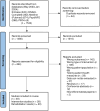Rehabilitation needs of adults after a brain tumour diagnosis: A scoping review
- PMID: 40674401
- PMCID: PMC12270154
- DOI: 10.1371/journal.pone.0325266
Rehabilitation needs of adults after a brain tumour diagnosis: A scoping review
Abstract
Rehabilitation can improve physical and cognitive function and quality of life in people who have been diagnosed with brain tumours. The aim of this scoping review was to examine the international evidence related to the rehabilitation needs and interventions of people diagnosed with a brain tumour. Relevant search terms were used to identify eligible studies and five databases were searched for original work published between January 2003 and December 2023. A total of 48 studies were included in the final review. A wide range of unmet rehabilitation needs across physical, cognitive, emotional or social domains were reported. In addition, a variety of interventions to improve function after a brain tumour diagnosis, have been investigated across healthcare settings. Our results indicated that rehabilitation needs can be prolonged and evolve over time which has implications for survivorship care. Many intervention studies investigating cognitive and physical rehabilitation reported beneficial outcomes. However, the relevant evidence is not implemented in current practice nor has widely contributed to the development of clinical practice guidelines to inform rehabilitation approaches for those with a brain tumour. This scoping review suggests limited evidence on patient-level needs, such as returning to work or community and social networks, and future research in these areas is recommended. Research which focuses on optimising interventions and the role of multidisciplinary teams is also required.
Copyright: © 2025 O’Donovan et al. This is an open access article distributed under the terms of the Creative Commons Attribution License, which permits unrestricted use, distribution, and reproduction in any medium, provided the original author and source are credited.
Conflict of interest statement
The authors have declared that no competing interests exist.
Figures
References
-
- National Strategy & Policy for the Provision of Neuro-Rehabilitation ervices in ireland. From Theory to Action. Implementation Framework 2019–2021. 2019.
Publication types
MeSH terms
LinkOut - more resources
Full Text Sources
Medical


